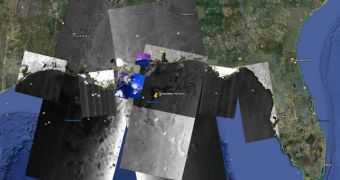High-profile cases such as the 2010 BP/Deepwater Horizon oil spill draw attention to the damage produced to the environment in the Gulf of Mexico, but analysts say that numerous, smaller leaks occur constantly. However, these events escape the public eye, and remained ignored by authorities.
When the Deepwater Horizon semi-submersible drilling rig exploded and sunk off the coasts of Louisiana, it triggered one of the worst environmental disasters ever. Experts estimate that around 200 million gallons of crude made their way into the waters of the Atlantic Ocean.
After the situation was brought back under control, authorities and the public were convinced that the Gulf was safe once more. However, new data indicated that oil well damages caused as far back as 2005 are still causing leaks around the entire area.
These data were obtained by the nonprofit group SkyTruth, which relies on analyzing satellite data to keep track of oil spill damage in the Gulf of Mexico and elsewhere. Studies experts here conducted on available information revealed multiple leaks that are still contaminating the waters.
Over the past few months, the organization started using airplanes and ships to monitor the Gulf. However, it still does not have sufficient resources to investigate all possible oil leaks. Such work is very important, since oil companies cannot be trusted to report accurately on oil spills.
“The oil industry has done a great job convincing the public that modern drilling pollution is nonexistent. But we’ve discovered wells damaged by hurricanes in 2005 that are still leaking,” explains the founder of SkyTruth, Johan Amos.
““We have some tools available to do investigations, but in many cases it’s just not enough. For smaller spills, we need an up-close look from satellite imagery,” adds the expert, who is a geologist. He used to work as a research scientist for a former oil company.
The scientist believes that keeping track of every oil spill in the Gulf would require as little as $3 million per year in funds. This sum is extremely small, when considering the costs of having an entire ecosystem destroyed.
“Oil polluters are assessed fines based on the quantity of oil spilled, which they’re required by law to report. But far offshore, out of sight of land, who has the resources to go out and check if it’s really a 0.7-gallon spill?” Amos goes on to say.
“It’s a system ripe for abuse, and I don’t think it’s really informing us about the state of what offshore pollution actually is,” he concludes, quoted by Wired.

 14 DAY TRIAL //
14 DAY TRIAL //